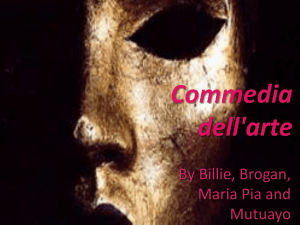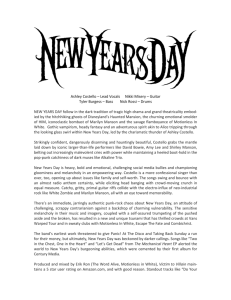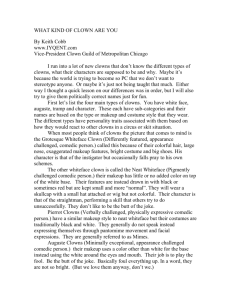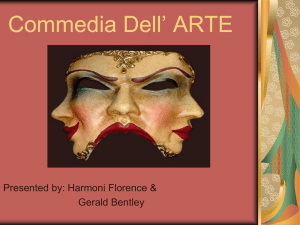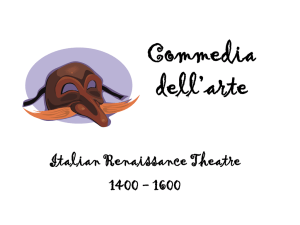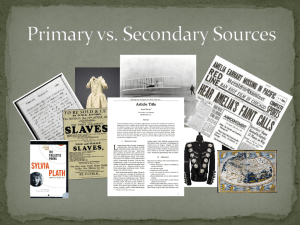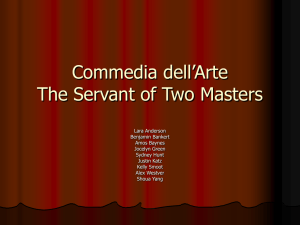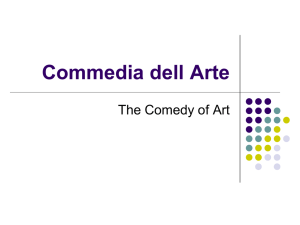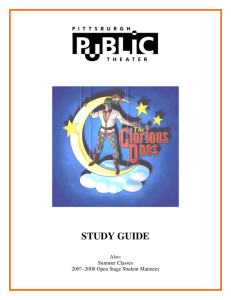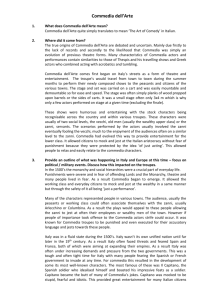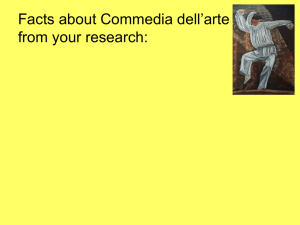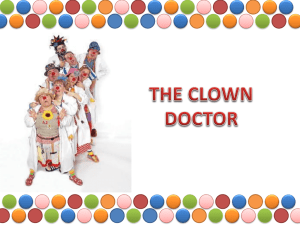The Art of Play
advertisement
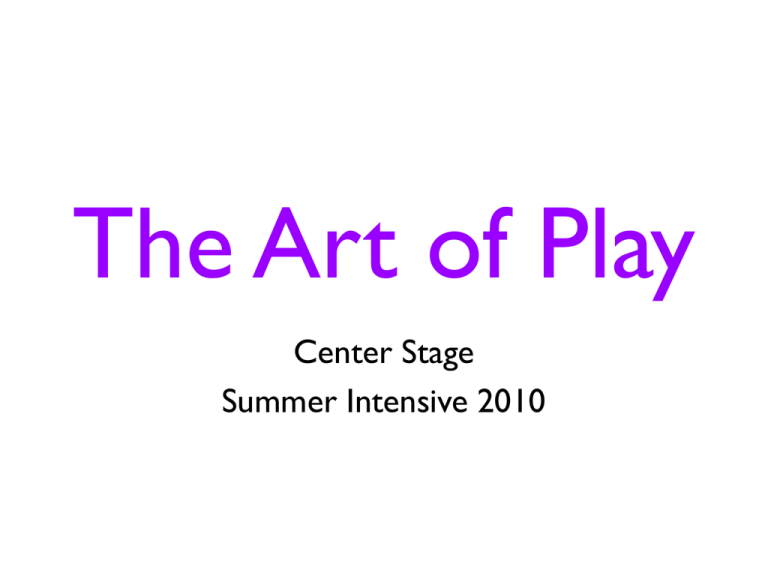
The Art of Play Center Stage Summer Intensive 2010 Clowning! What is a Clown? • a fool, jester, or comedian in an entertainment (as a play); specifically : a grotesquely dressed comedy performer in a circus. • a person who habitually jokes and plays the buffoon Clowns and clown-like characters are an important part of numerous theatrical traditions through out history. After all, who doesn’t want to let off some steam and laugh? From the Romans through the Renaissance, you could find a clown or a jester in many royal courts whom would lift the sprits of the King and Queen with their antics. Commedia Dell’Arte During the 16th century, the Italian tradition of commedia dell’arte exploded throughout Europe, soon becoming the dominant theatre form. The name commedia dell’arte translates to comedy of the profession. Plays were improvised around a basic outline and stock characters. You could tell which characters were which by their colorful masks and costumes. The Servants The servants of commedia dell’arte are smart, sassy, and very hungry. They always know more about how to operate in the real world than their silly Old Men or Lover masters, and use that knowledge to gain an advantage over them. Characters in this type include Arlecchino the Harlequin, the Zanni, the Soubrette female servant, and Pedrolino. The Old Men The old men were the real fools of commedia dell’arte, although they were never fully in on the joke. Pantalone the merchant, Il Dottore the doctor, and Il Capitano the captain make up this category. The old men are greedy, simple-minded, and cowardly. The old men are very easy targets for the pranks and jokes of the servants. The Lovers The lovers are the least clown-like characters in commedia; they wore fashionable costumes without masks. In love with being in love, the lovers’ trials were the main conflicts in the plays, but they always worked out happily ever after. An actor playing in a commedia dell’arte troupe would be assigned one character to portray for their time with the group. This role would never change, and it allowed the actor to really explore and master their part, making it their own. Joseph Grimaldi Grimaldi is one of the most famous clowns from England, and the first to popularize white-face make up. He was known for his acrobatic ability and funny songs. Grimaldi is the major influence on today’s circus clowns. But are all clowns found in the circus? No! Clowns can be found in many performing arts, especially in film and radio. Charlie Chaplin Charlie Chaplin is one of the best known actors of the silent film era. Chaplin, born in England in 1889, began performing in vaudeville theatres at 14, and traveled to America in 1910. He stared in 87 films and directed 75 of them throughout his 40 year long career in film. Charlie Chaplin “The Tramp” is Chaplin’s best- known character, and was featured in 14 short and feature length films. “The Tramp” is a poor traveling man who has the clothes and manners of a refined gentleman. Charlie Chaplin In his films, Chaplin uses dance and slapstick comedy to make his audience laugh. Clips from some of Chaplin’s best known movies can be found here. Laurel and Hardy Laurel and Hardy are a comedic duo whom enjoyed their greatest success in American film during the 1920s through the mid 1940s. The duo also developed a live theatrical act which they toured throughout America and Europe. Stan Laurel [left] was from England, and Oliver Hardy [right] was from the USA. Laurel and Hardy Laurel and Hardey’s comedic style was based in slapstick, musical numbers, and visual jokes. You can find wonderful examples of their comedy here, here, and here. The Three Stooges The Three Stooges are one of America’s most loved comedic groups. The Three Stooges are made up of Moe Howard [on the left], Curly Howard [center], and Larry Fine [right]. The Three Stooges The Stooges began as a vaudeville act in 1925, but the classic group of Larry, Curly, and Moe wasn’t formed until 1933. In 1934, the Stooges signed with Columbia Pictures and appeared in 190 short films and 5 feature-length films by 1947. The group has also included members Shemp Howard, Joe Besser, and Joe “Curley Joe” DeRita. The Three Stooges The Three Stooges are best known for their violent physical humor and slapstick comedy. Excellent examples of their comedic style can be found here, here, here, and here. Abbot and Costello Abbot and Costello are an American comedy duo whom were most popular during the 1940s and 1950s. William Abbot is the man on the bottom of the photo, and Lou Costello is standing above him. Abbot and Costello Both Abbot and Costello performed as burlesque comedians before forming their duo in 1935. In February 1938 the duo made their radio début and started their own radio show in 1941. Abbot and Costello also appeared in 36 films with Universal Studios between 1940 and 1956. Abbot and Costello Abbot and Costello use wordplay in the majority of their skits, and play off of each other to hilarious outcomes. Their most famous routine is called “Who’s on First?” and can be found here. What kind of clown do you want to be? A circus clown? A slapstick clown? A musical clown? A member of a comedic group? Let’s find out!
